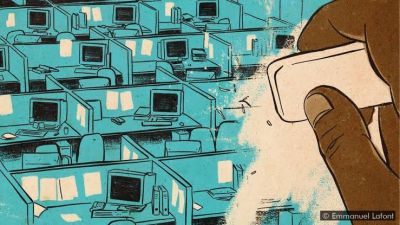In one recent survey, 80% of U.S. workers said they're just as productive or more productive working from home.
The pandemic is forcing a sea change in how business leaders view the traditional work environment. It's also raising the argument about where we will end up working post-pandemic.
Consider this recent declaration from Salesforce. In his Feb. 9 blog post, Brent Hyder, Salesforce president and chief people officer, wrote: "As we enter a new year, we must continue to go forward with agility, creativity and a beginner's mind -- and that includes how we cultivate our culture. An immersive workspace is no longer limited to a desk in our Towers; the 9-to-5 workday is dead; and the employee experience is about more than ping-pong tables and snacks."
Salesforce will offer its employees flextime, fully remote and in-office options. However, not all executives are on board with the concept of a distributed or hybrid work environment. Last month, at a virtual panel held during the World Economic Forum, two executives from major financial institutions said that working at home is losing its effectiveness.
Jes Staley, chief executive at Barclays, argued that working from home is "working as well as it is, but I don't think it's sustainable." Echoing that sentiment, Mary Erdoes, chief executive at J.P. Morgan Asset & Wealth Management, stated that employees' ability to focus "is fraying. It is hard. It takes a lot of inner strength and sustainability (without) the energy that you get from being around other people."
The other side of the WFH coin
But, according to Thomas Moran, chief strategy officer at Prodoscore, which provides employee visibility and productivity intelligence software, year-over-year surveysdemonstrate that working from home is not only sustainable, it also delivers increased productivity.
"We analyzed over 105 million data points collected from 30,000 U.S.-based Prodoscore users, revealing a 5% increase in productivity year over year, challenging the assumption by business leaders that employees working from home are less productive than when working on-site in an office," said Moran.
Adrian Reece, Principal Statistical Consultant at Salesforce added that workers in 2021 are looking to improve on their work autonomy and not have their freedoms regressed back into an office. "Research prior to the pandemic demonstrates the positive impact working from home has on an employee's job satisfaction; research during the pandemic has shown people are more productive at home than they were in the office. Hybrid in-person/telecommuting models are here to stay and represent the new frontier in work engagement and performance management research," said Reece.
To this point, Moran added, "Knowledge-based workers do not need to sit in a specific physical location in order to produce quality work. Done well, with companies investing in technologies to support the distributed structure, productivity is greatly enhanced."
Remote work productivity trends
Increases in productivity from remote workers is not a 2020 trend, as noted in this 2013 study of a WFH experiment at CTrip, a 16,000- employee, NASDAQ-listed Chinese travel agency.
CTtrip tracked its call center employees who had volunteered to work from home, finding a 13% increase in their productivity. At the time of this study, only 10% of U.S. employees were working from home - compared to 42% during the height of the pandemic.
In Prodoscore's 2020 survey of 1,000 U.S.-based workers, 80% said they're just as productive or more productive from home, and 91% appreciate the flexibility to manage their own schedules. "We're learning more about how employees can be most productive on their own terms," said Moran.
Working from anywhere demands consideration of an asynchronous schedule, allowing contributions from the workforce during the hours when individuals can be most productive. Variance, flexibility, intentional change to process, enabling collaboration from different associates at different times -- all require a new management style.
Moran acknowledged that a high-performing remote workforce needs some tender loving care from management. "It requires support, flexibility, and good coaching," he said.
Inc
